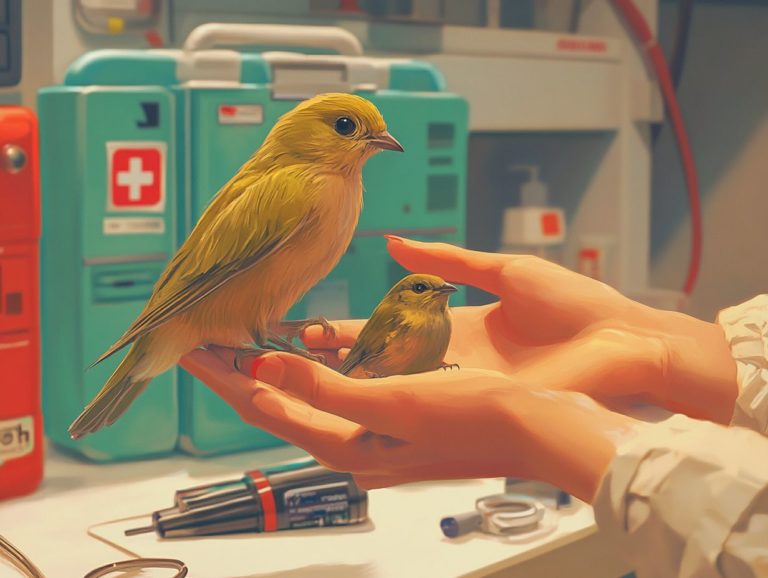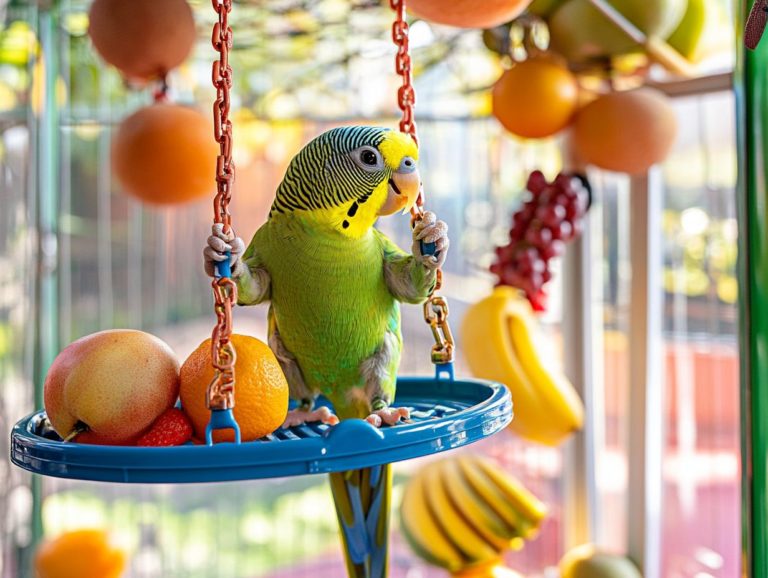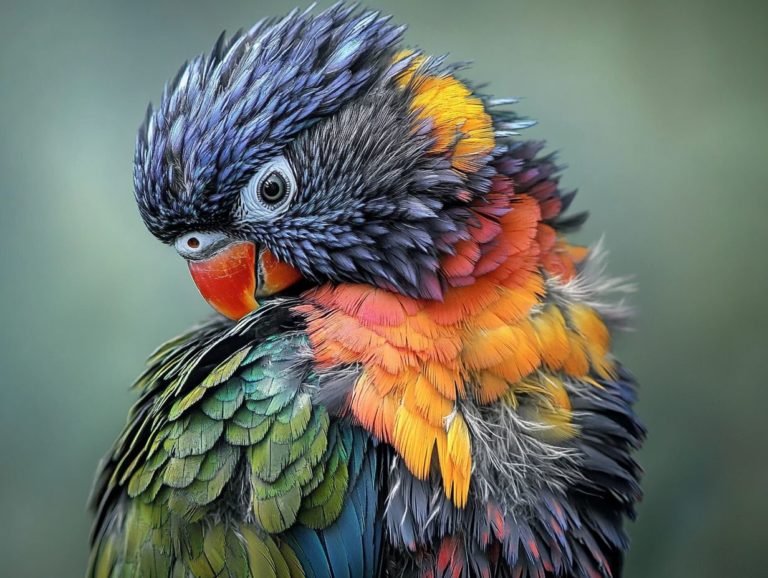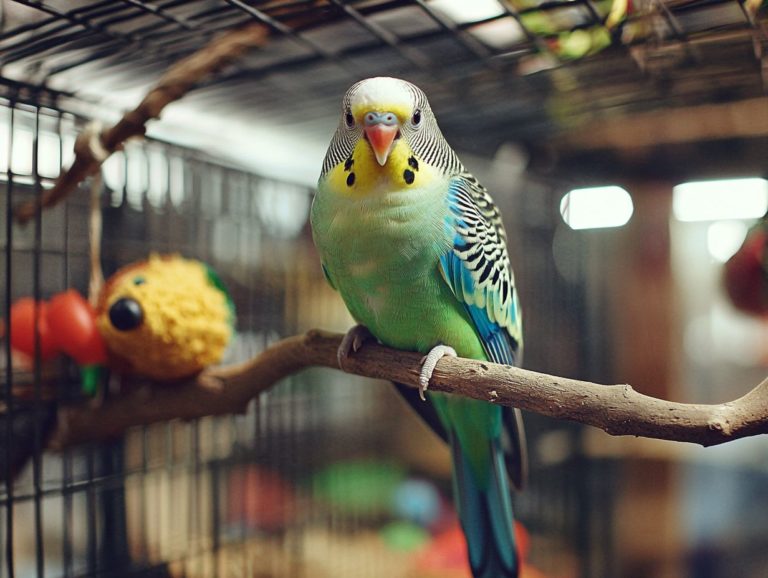The Importance of Regular Vet Visits for Birds
Regular vet visits are vital for the health and well-being of your feathered companions, especially for bird owners who want to keep their pet birds thriving.
Just like cats and dogs, birds need preventive care to avoid common health issues from neglect, such as behavioral challenges and emotional trauma. This article explores the benefits of routine check-ups, what to expect during a visit, and how often various bird species should see a vet.
You ll also find tips on finding a qualified bird vet and preparing for your appointment with a veterinary nurse who understands how to care for birds. Keep your bird happy and healthy with regular vet visits!
Contents
- Key Takeaways:
- Why Regular Vet Visits are Important for Birds
- What to Expect During a Bird Vet Visit
- How Often Should Birds See a Vet?
- How to Find a Qualified Avian Veterinarian
- Tips for Preparing for a Vet Visit with Your Bird
- Frequently Asked Questions
- What is the importance of regular vet visits for birds?
- How often should I take my bird to the vet?
- What can I expect during a regular vet visit for my bird?
- Why are regular vet visits important for preventing diseases in birds?
- Can regular vet visits be beneficial for my bird’s behavior?
- What should I do if I notice any changes in my bird’s behavior or health between vet visits?
Key Takeaways:
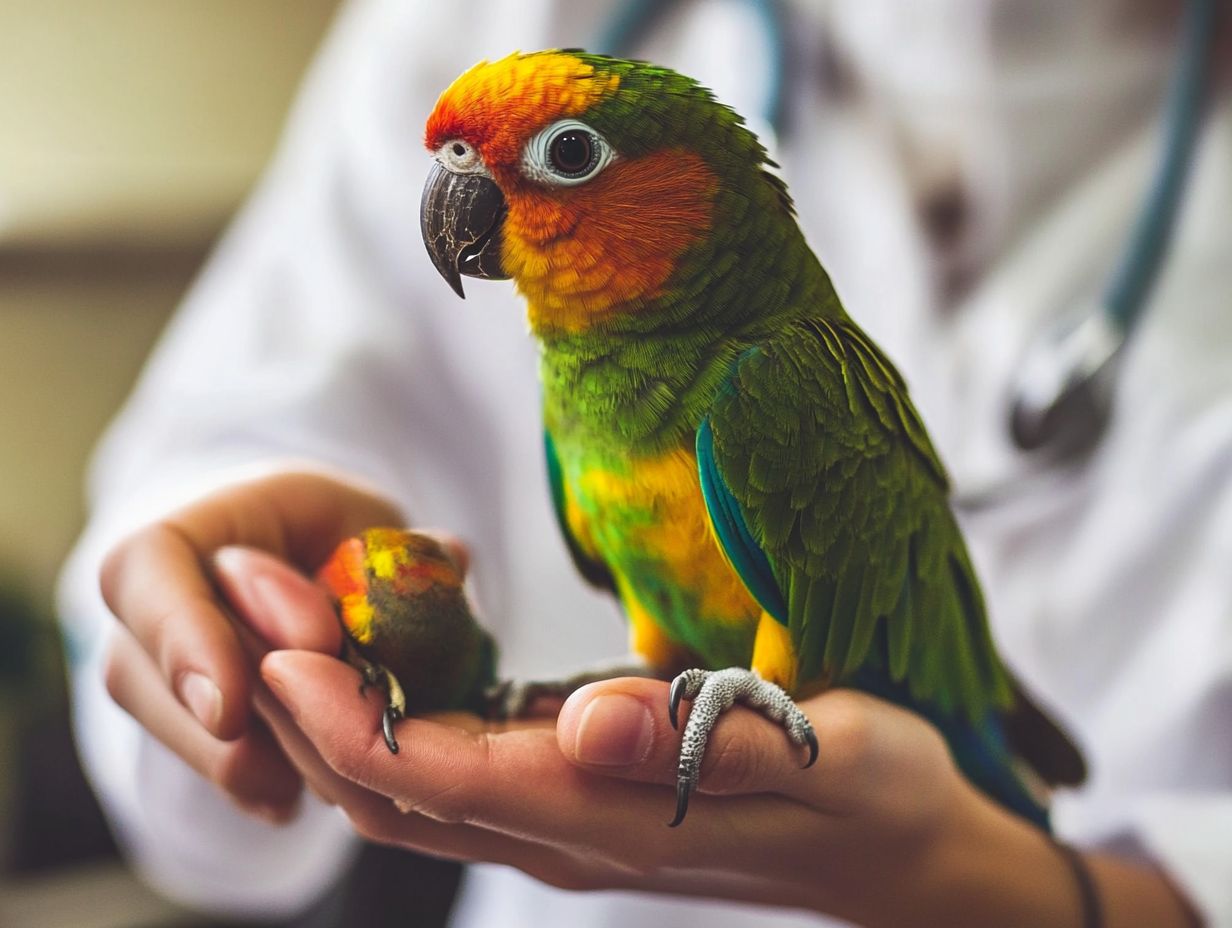
- Schedule regular vet visits to maintain your bird’s health.
- Utilize preventive care to catch health issues before they become serious.
- Find a qualified bird vet and prepare for the vet visit for the best care.
Why Regular Vet Visits are Important for Birds
Regular veterinary visits are essential to ensure the health and happiness of your feathered companion, like a Budgie. As a responsible bird owner, recognizing the importance of annual check-ups especially with a specialist in bird care can prevent health issues and enhance your pet’s quality of care.
These routine examinations help detect early signs of illness. They also play a crucial role in managing stress, creating a nurturing environment for your birds, and enhancing their overall well-being during visits.
Benefits of Preventive Care
Preventive care is key to ensuring a long and joyful life for your pet, including Budgies, by addressing potential health issues before they escalate. This proactive strategy allows you to catch health complications early, preventing serious medical concerns that might go unnoticed.
Regular vet visits give professionals the opportunity to evaluate your bird’s overall health and identify behavioral changes that might signal underlying problems. These check-ups often include routine screenings and vaccinations that protect against common bird diseases.
By adopting a comprehensive preventive care plan, you not only safeguard your feathered companions but also nurture a strong bond based on trust and understanding, ultimately enhancing the quality of life for all your birds, such as cockatiels and lovebirds.
Common Health Issues in Birds
Birds, including Budgies, can face various health issues, making it essential for you to recognize common problems and seek prompt veterinary care. These vibrant companions may experience respiratory issues due to environmental factors, which can escalate if left unaddressed.
Nutritional deficiencies can occur when their diet lacks essential vitamins and minerals, posing risks to their overall health. Emotional trauma is also a significant concern that can lead to behavioral challenges, affecting their well-being and social interactions.
Regular health checks are crucial for identifying these issues early, enabling you to provide prompt treatment and achieve better outcomes for your delicate friends. By understanding their needs, you can create a safe and nurturing environment that supports their health and happiness.
What to Expect During a Bird Vet Visit
When taking your pet bird, especially a Budgie, for a vet visit, you can expect a comprehensive examination conducted by a skilled bird veterinarian. This thorough assessment includes health evaluations and detailed inspections designed to uncover any underlying concerns.
The vet will also focus on the emotional handling of your bird during the visit to ensure a positive experience. By being prepared, you help create a low-stress environment for your feathered friend!
Examinations and Tests
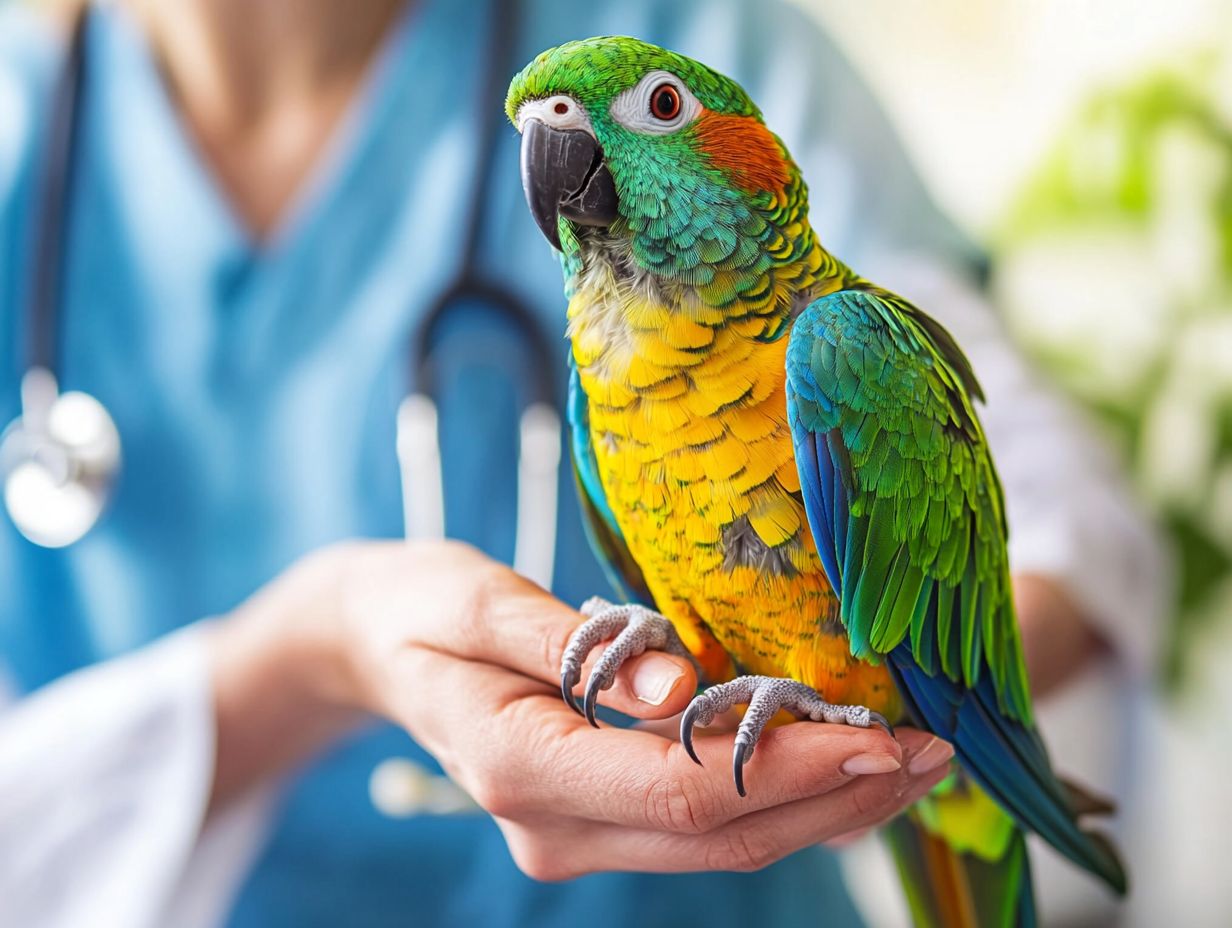
Examinations and tests conducted by an avian vet are essential for evaluating your bird’s health and understanding their body language. They can indicate health problems and show important signs of bird behavior.
These health assessments typically begin with a comprehensive physical examination, during which the vet looks at your bird s feathers, beak, and overall condition. Blood tests and routine screenings may also be performed to uncover any hidden ailments, ensuring a thorough health check.
Observing how your bird reacts to handling and various stimuli is vital; even subtle changes in behavior can provide significant insights into their mental and physical well-being.
Recognizing these stress responses helps with diagnosis and enables the vet to create a tailored care plan. This ensures your feathered companion enjoys a vibrant, healthy life through proper care and treatment options.
Treatment Options
After the exam, your vet will discuss treatment options tailored to your bird s needs, ensuring your Budgie receives top-notch care.
Your vet can recommend various medications to help your bird recover from specific illnesses or ailments, which could be vital for recovery. Dietary changes can also make a significant difference; introducing a balanced and nutritious diet can enhance overall well-being and help prevent future health issues, including behavioral issues that arise from poor nutrition.
Behavioral interventions are techniques used to reduce stress and improve your bird’s mood, fostering a happier, healthier environment. In this context, the expertise of veterinary practices is invaluable, as they not only offer medical treatment but also provide guidance on emotional handling essential for your bird s recovery and comfort.
How Often Should Birds See a Vet?
The frequency of veterinary visits for birds, including Budgies, is crucial for maintaining their health. It s crucial to schedule at least an annual visit with a bird doctor to ensure your feathered friend receives the best care possible.
Recommendations for Different Species
Regarding avian care, different species of birds have their own recommendations for vet visits. For instance, Budgies typically need annual check-ups to monitor their health effectively.
Larger species like African Grey Parrots or Macaws usually require more frequent evaluations generally every six months. This is particularly important if they are older or showing any health concerns. These visits serve a dual purpose: monitoring your bird’s well-being and providing opportunities for avian specialists to offer tailored advice on diet adjustments, behavioral issues, or preventive care specific to their life stage.
If you’re caring for a bird recovering from illness, it’s wise to consult your vet more regularly. This ensures effective health maintenance and treatment options, leading to a smoother recovery process.
How to Find a Qualified Avian Veterinarian
Finding a qualified avian veterinarian is crucial for the health and well-being of your bird. Understanding the key criteria to consider can greatly enhance the quality of care your Budgie receives, especially when choosing an avian vet with experience in treating exotic pets.
Ensure your bird’s happiness and health by booking a vet visit today! Remember, birds bring joy and companionship, making regular vet visits essential.
Factors to Consider
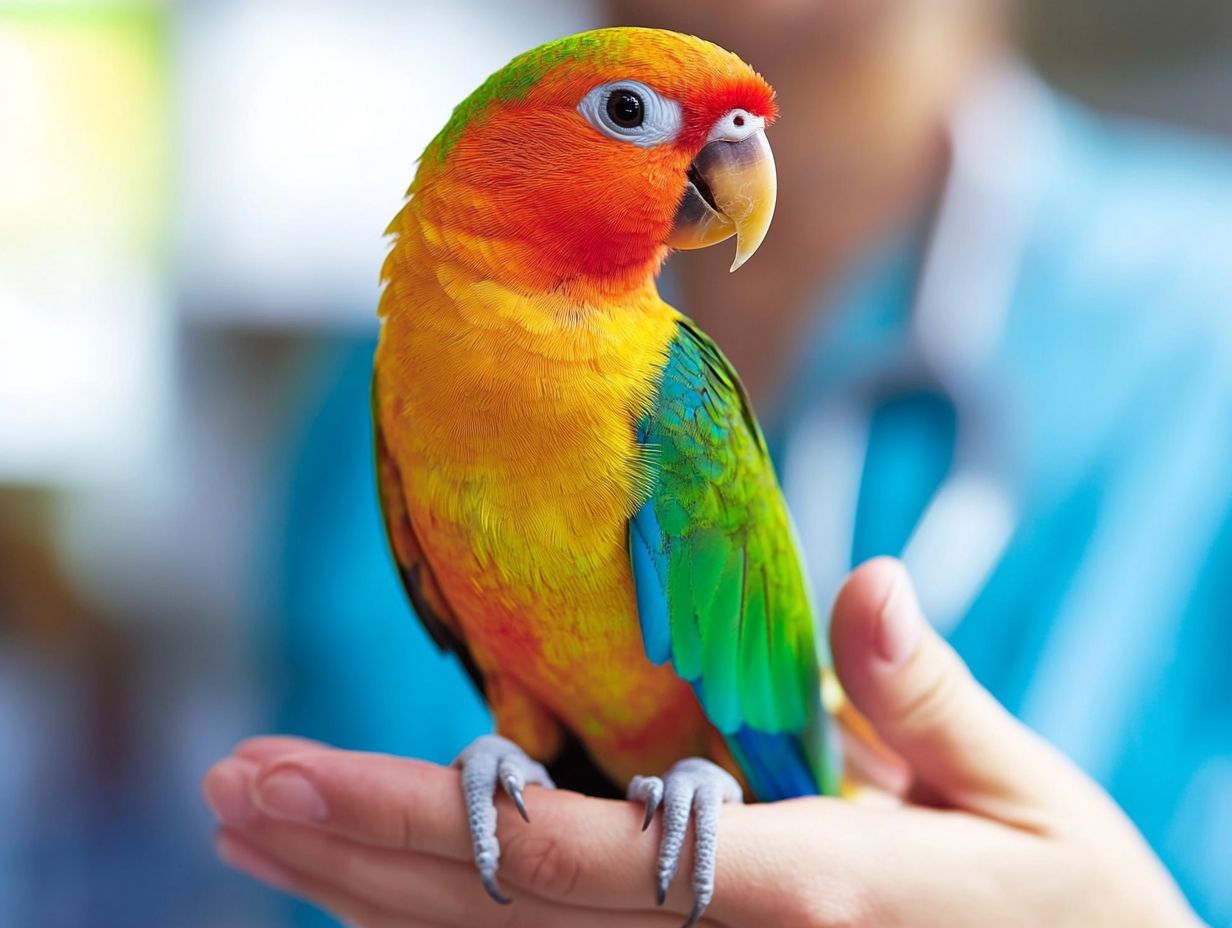
When you re on the hunt for a qualified avian veterinarian, there are several key factors to consider: their experience with birds, their commitment to client education, and the veterinary practices they uphold.
The vet s expertise in treating different species of birds is crucial to ensuring your feathered friend receives the best care. Seek out practitioners who have pursued extra training in avian medicine and emergency procedures. Proximity matters; choosing a nearby veterinary clinic can alleviate travel stress during critical situations, especially when caring for sensitive avian patients.
An engaging approach to client education is vital. It enables you to gain valuable insights into your bird’s health, nutrition, and behavioral needs. A veterinarian who invests time in sharing knowledge can truly enhance the well-being of your beloved pet.
Tips for Preparing for a Vet Visit with Your Bird
Preparing for a vet visit with your Budgie can greatly alleviate stress for both you and your feathered companion. By knowing what to bring and what to expect, you can ensure a much smoother experience for everyone involved.
What to Bring and What to Expect
When you visit an avian vet, knowing what to bring and what to expect can set the stage for a successful and low-stress experience for your Budgie.
Start by bringing your bird’s medical records. These documents offer essential insights into their health history and any prior treatments. A comfortable, secure carrier is also a must it can ease their anxiety during travel. Consider including a favorite toy or blanket to help your feathered companion feel more at home.
During the visit, you can expect a thorough examination that includes a physical check-up, weight assessment, and possibly some lab tests. This all aims to provide the best possible care for your avian friend.
Frequently Asked Questions
What is the importance of regular vet visits for birds?
Regular vet visits are essential to keep your bird happy and healthy! Just like humans, birds require routine check-ups to detect and prevent any potential health issues.
How often should I take my bird to the vet?
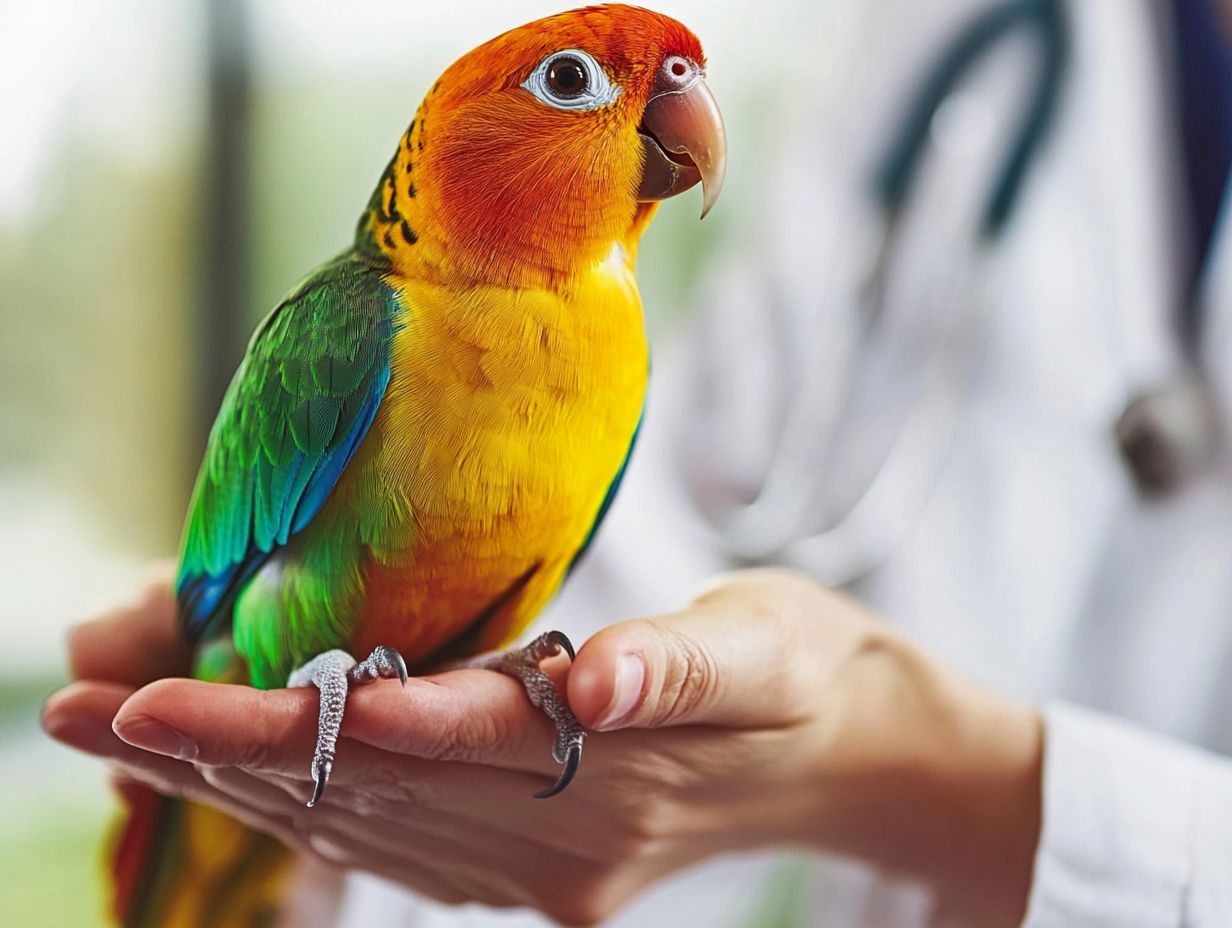
It is recommended to take your bird to the vet at least once a year for a general check-up, and more frequently if they have health concerns or are at a higher risk for certain diseases.
What can I expect during a regular vet visit for my bird?
During a regular vet visit, your bird will undergo a physical examination, including weight, body condition, and overall health assessment. The vet will conduct diagnostic tests and discuss any necessary vaccinations or treatments.
Why are regular vet visits important for preventing diseases in birds?
Birds can easily hide signs of illness. By the time they exhibit symptoms, it may be too late. Regular vet visits allow for early detection and treatment of potential diseases, leading to a better prognosis for your bird.
Can regular vet visits be beneficial for my bird’s behavior?
Yes! Regular vet visits can also help with your bird’s behavior. The vet can provide tips and advice on how to care for your bird properly, leading to a happier and healthier pet.
What should I do if I notice any changes in my bird’s behavior or health between vet visits?
If you notice changes, schedule a vet visit right away. Early detection and treatment can make a significant difference in your bird’s health and well-being.
For more information on avian care or to schedule a check-up, contact your local veterinarian today!


